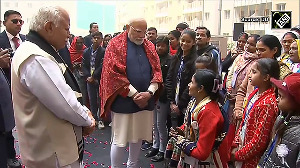Even as the United Nations Security Council voted to impose new and punitive sanctions against Iran for its alleged clandestine nuclear weapons program, the United States and India have apparently reached a modus vivendi vis-à-vis each other's concerns regarding Iran.
Washington is confident that New Delhi will support any action against Teheran when it comes to sanctioning Iran for its refusal to abide by the Nuclear Nonproliferation Treaty, but with an understanding of India's refusal to isolate Iran diplomatically and economically considering the long-standing strategic and civilizational India-Iran ties.
Both during the run-up and after the meetings that took place as part of the inaugural US-India strategic dialogue, senior Obama administration officials made clear that they had reached this understanding with India, which was confirmed by External Affairs Minister S M Krishna at a interaction with the press before he left Washington, after co-chairing the dialogue with US Secretary Hillary Clinton.
Under Secretary of State for Political Affairs William Burns, who discussed the issue of Iran with his counterpart Nirupama Rao on the sidelines of the strategic dialogue, at a major speech on India's Rise and the Promise of US-Indian Partnership at the Council on Foreign Relations, said, "India has made clear its opposition to a nuclear-armed Iran, and voted again at the International Atomic Energy Agency Board of Governors meeting last November to hold Iran accountable for its failure to live up to international obligations."
Later at the interaction that followed, Burns acknowledged that there are important shared interests between India and the United States in the Persian Gulf notwithstanding some great differences in perspective regarding Iran.
"On Iran," he said, "we don't necessarily have a uniform view of the issue, although on the nuclear question India has made quite clear its opposition to a nuclear-armed Iran."
Burns argued that India "has an admirable record of implementing previous Security Council resolutions," and noted, "as I mentioned in my remarks, it's been quite straightforward in holding Iran accountable at the IAEA board of governors when it's failed to meet its obligation. So, that's an issue on which it's also important for us to continue to stay in close touch."
Asked by India Abroad how India will walk the tightrope on Iran, since the US has been building up a critical mass in the international community to isolate Iran even as New Delhi has argued against sanctions but for continued diplomatic overtures, Krishna acknowledged that the issue had indeed come up in his discussions and the meeting between Rao and Burns too.
He said, "India's position is very clear that we are against all proliferation. Number two, I was in Iran just a few weeks back and then I've had discussions with them and then our point of view has been duly conveyed to them -- that every country, which would like to use their nuclear technology for peaceful purposes like augmenting their energy requirements, that country should have the liberty, but the liberty will have to be exercised within the parameters set out by the International Atomic Energy Commission and the Nuclear Suppliers Group."
"So, we are hoping that Iran and the International Atomic Energy Commission will come to some understanding, and there are other powers also trying to be helpful in bringing about a better understanding."
Later, Assistant Secretary of State for South Asian Affairs Robert Blake in reinforcing this modus vivendi between Washington and Delhi on Iran, said in a web-chat that "we have come to a good understanding of where we stand on this very, very important issue for both of us."
He too acknowledged that "this was a subject of conversation during the strategic dialogue, but has also been a continuing part of our conversation in every meeting that we have with our Indian friends."
"From our perspective," Blake said, "the most important thing has been India's strong support in, first, observing all of the United Nations Security Council obligations, but also the very important votes that it has taken in the IAEA; taking a strong stand against Iran's nuclear weapons program."
He said at the same time, "India has explained to us that it has important links with Iran, first of all because its transit into Afghanistan is closed by Pakistan and so it must use Iran to get many of its goods, and indeed people into Afghanistan through Iran. So, that's a very important part of their relations."
Blake said there's an Iranian angle in Indian domestic politics too, and explained that "the Indians also have a small but influential Shia community inside India, which can be an important swing vote in Indian elections. So, they do have these civilizational ties that they talk about."
Thus, he reiterated that "we understand the interest that India has in Iran," but noted that "we also go to great lengths to explain our concerns and to make sure that, again, we are not crossing any of each other's red lines."
"And, so far," Blake said, "we've managed that conversation pretty well. But again, this is going to be a very important priority for the United States."






 © 2025 Rediff.com -
© 2025 Rediff.com -